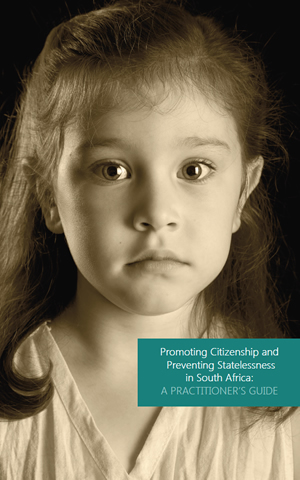Promoting Citizenship and Preventing Statelessness in South Africa: A Practitioner's Guide
Edited by Lawyers for Human Rights
2014
ISSN: 978-1-920538-30-9
Pages: 152
Print version: Available
Electronic version: Free PDF available
About the publication
‘Everyone has the right to a nationality’ Universal Declaration of Human Rights. Without the protection afforded by citizenship and nationality individuals face insecurity, discrimination and marginalisation without any means of accessing protection.
Stateless persons are among the most vulnerable and are often denied the enjoyment of rights such as equality before the law, the right to work, education and healthcare. Being stateless means that individuals may not even be able to marry or register the births of their own children.
Lawyers for Human Rights has drafted this Guide to assist legal practitioners and social workers dealing with cases of persons at risk of statelessness as well as de jure stateless persons. The Guidelines are meant to address a gap in the protection of stateless persons. In the absence of a Statelessness Status Determination Procedure these guidelines create a net of protective measures which may be relied on to protect and assist this group of persons to access documentation and citizenship.
About the editors:
Lawyers for Human Rights is an independent human rights organisation with a 35-year track record of human rights activism and public interest litigation in South Africa. LHR uses the law as a positive instrument for change and to deepen the democratisation of South African society. To this end, it provides free legal services to vulnerable, marginalised and indigent individuals and communities, both non-national and South African, who are victims of unlawful infringements of their constitutional rights.
Table of Contents
Foreword
Acronyms
- Introduction
- Defining the concepts
2.1 Citizenship or nationality
2.2 Stateless
2.3 At risk of statelessness
2.4 Birth registration
2.5 Undocumented person
2.6 Irregular migrant
2.7 Jus soli
2.8 Jus sanguini
2.9 In situ stateless persons
2.10 Nationality acquired by automatic modes versus nonautomatic modes
2.11 Discretionary versus non-discretionary applications for citizenship - Legal framework on nationality and statelessness in South Africa
3.1 International law
3.2 South African Legal Framework - Assessing citizenship and identifying a stateless person in practice
4.1 Step One: Personal history interview
4.2 Step Two: Analysis of the states to which the client has ties
4.3 Step Three: Make your initial assessment
4.4 Step Four: Approaching competent authorities to confirm nationality status
4.5 Step Five: Apply the UNHCR guidelines and confirm client's citizenship or stateless status - Finding a solution for clients: immigration status and citizenship
5.1 People with an unrecognised claim to South African citizenship
5.2 Stateless persons with no claim to South African citizenship
5.3 Last resort options: litigation and resettlement - Prevention of statelessness
6.1 Assisting vulnerable children
6.2 Birth registration of other foreign children - Checklist of strategies to assist clients
- Assisting stateless persons in immigration detention
8.1 Stateless persons' right to release from immigration detention
8.2 Protection from arbitrary arrest through documentation
8.3 Preventing deportation to a country where a person would not access citizenship - Advocacy
- Annexure
10.1 Application to the Minister of Home Affairs for permanent residence exemption
Keywords:
